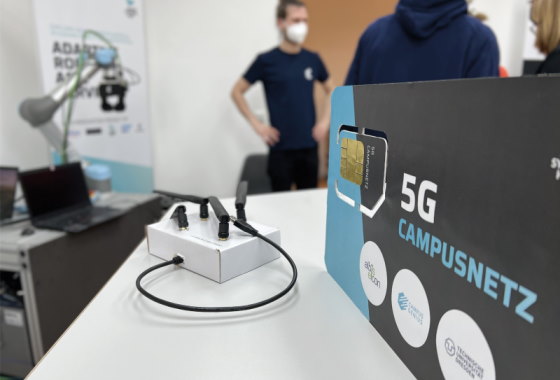New 5G Network for the Internet of Things
With 5G campus network, robots and other high-tech infrastructure, an experimental field is being created in Dresden for the growing IoT economy in Saxony.
Dresden. In view of the growing interest of industry in practical experience and innovative solutions related to the Internet of Things (IoT), the Smart Systems Hub is expanding its IoT Lab in Dresden’s Neustadt district. From now on, companies and institutes can, for example, also remotely control robots through computer clouds using 5th generation mobile communications (5G).
In total, the hub and its partners from industry plan to invest around half a million euros in the new lab by 2023. It is designed as a nucleus and testing environment for the thriving IoT community in Saxony.
“With our IoT Lab, we are creating an experimental field for our partners and customers where they can practically test their own new products and services,” explains Michael Kaiser, the managing director of the “Smart Systems Hub”. A particular focus is on industrial applications and 5G networking. “Numerous players are waiting in the wings and want to use these new technologies for their business development. But many fear high initial investments and are unsure whether their product ideas will work and pay off in practice. In the IoT Lab, they can test this out and combine different networking technologies, cloud connections, interfaces and modern robotics solutions.”
The 50-square-meter laboratory is located on Antonstraße on the emerging “Co-Innovation Campus” opposite Dresden-Neustadt train station. The target group primarily includes manufacturers of technology components, system integrators and IoT users. Available in the lab are modular convertible sensor nodes for machines, robots and other devices. There are also various “gateways” for the changing lab users, i.e. interfaces between local sensor technology and the computing technology at the network edge (“edge clouds”) or more distant high-performance computing centers. Here, the “things” in the “Internet of Things” can be networked via mobile communications, WiFi and other technologies.Particularly interesting: The IoT Lab has its own 5G campus network that is isolated from the outside world – in other words, a network that only the people, machines, robots and mobile devices of the respective lab user can utilize.
Teaching collaborative robots in the cloud
As the latest technology component, the partners from industry have now installed a collaborative robot from “Universal Robots” in the laboratory. It can be taught via an app from the robotics software company “Wandelbots” using an iPad without additional programming. This allows the experimenters to test how robots in industry and trade can be taught from the cloud or controlled remotely by artificial intelligence (AI).
One of the first lab users is the Dresden-based company “DELTEC electronics GmbH”: “We are currently developing an IoT starter kit that is intended to make it easier for our customers to get started with the Internet of Things,” reports Managing Director Uwe Wagner. “We want to test this kit in practice here at the Smart Systems Hub.”
“The IoT Lab fills a real gap,” emphasizes Tanja Klärner of telecommunications equipment supplier albis-elcon system Germany GmbH from Hartmannsdorf in Saxony, which together with Dresden-based CampusGenius GmbH supplied and installed the network technology for the 5G campus network in the lab. “This is an opportunity for companies to experimentally develop new models and applications for IoT networking using this new and powerful technology.”
“The Smart Systems Hub thus creates an ideal environment to assess the cost, security and reliability of a new 5G IoT solution before making a major investment decision,” adds CampusGenius co-founder Thomas Höschele. He said potential early adopters for IoT 5G campus networks can be found primarily in manufacturing, logistics, ports and hospitals.
“We see a fast-growing market”
The implementation of digital business models in industry through the virtualization of hardware via software is also on the agenda at the IoT Lab: In the future, more and more companies will no longer buy their assets, but will only pay for the usage time of the digitally managed service. “This is a prosperous market that we want to develop together with the Smart Systems Hub and other partners, such as Objective Partner,” says Mirko Paul, vice president of Industry Cloud Architecture in SAP’s Technology & Innovation division. “In the IoT Lab, we are creating the reusable environment necessary for this, in other words, a kind of architecture blueprint.”
SAP and Objective Partners have already developed an application example of this with the help of the Smart Systems Hub and in collaboration with customers and buyers: The digitization of load carriers made of the renewable resource wood by the company Ligenium. In addition to billing data, this can also analyze emissions data for regulatory purposes within the Supply Chain Sourcing Obligations Act.
The latest expansion stage in the IoT Lab also allows new robotics concepts to be tested in practice before they go into series production. “How do we manage to give robots as much artificial intelligence as possible when they are used locally in the factory, but at the same time we want to save weight and conserve their batteries? How much computing power can we move to the cloud or edge cloud? And how do we achieve the necessary short latency times?” says Sebastian Werner from the Dresden-based robotics software company Wandelbots, outlining some of these challenges.
Über CampusGenius
CampusGenius ist ein junges Unternehmen, das 2020 in Dresden und Berlin gegründet wurde. CampusGenius widmet sich der Planung, dem Bau und dem Betrieb von 5G-Campusnetzen sowie der Integration von Anwendungen. CampusGenius wurde von Mobilfunkexperten und Forschern des Deutschen Telekom Lehrstuhls für Kommunikationsnetze der TU Dresden gegründet, deren Erfahrungen in Kernarchitektur, Management und Konfiguration von 5G-Campusnetzen in das Unternehmen einfließen. CampusGenius nutzt Soft- und Hardwarelösungen namhafter Hersteller, bietet aber auch selbst entwickelte 5G Core Software und OSS an.
CampusGenius – Dedication to Communication.
Über albis-elcon
albis-elcon liefert Produkte, Lösungen und Dienstleistungen, die Unternehmen, vor allem Kommunikationsdienstleistern, helfen, bessere Netze aufzubauen und zu betreiben und den Energiebedarf zu senken. Mit 15 Millionen installierten Geräten in mehr als 40 Ländern ist das Unternehmen gut positioniert, um softwaredefinierte und Virtualisierung bereitzustellen, die Gigabit-Netzwerke für Cloud-Computing, Unternehmenszugang, mobiles Backhaul und 5G-Campus-Netzwerke ermöglichen.
Hochentwickelte Hardware, Software, Netzwerkmanagement und Implementierungsservices verwalten die Komplexität und sorgen für eine nachhaltige, sichere Kommunikation.
albis-elcon — power to complete networks.
Mehr: www.albis-elcon.com.
Über den Smart Systems Hub
Der Smart Systems Hub – Enabling IoT ist Europas größter One-Stop-Shop im Bereich Internet der Dinge (IoT). Mit seinem Netzwerk von über 450 Partnern – darunter Schlüsselpartner wie Infineon, SAP, T-Systems und Globalfoundries – verfügt er über umfassende Kompetenz in den IoT-Kernbausteinen Software, Hardware und Konnektivität. In direktem Auftrag des Bundesministeriums für Wirtschaft und Energie (BMWi) bringt er Innovationen aus einem der größten Mikroelektronik- und IT-Cluster Deutschlands in die industrielle Anwendung. Hierfür ermöglicht er Zugang zu Referenzlösungen und Technologien (IoT Lab) und entwickelt in einem methodisch geführten Co-Innovationsprozess Konzepte, Prototypen und erste Produktversionen in maximal drei Monaten.
Mehr: https://smart-systems-hub.de.
Über Wandelbots
Wandelbots glaubt daran, dass die Welt ein besserer Ort wird, wenn sich Menschen auf ihre Kreativität konzentrieren können und monotone Arbeiten an Roboter abgeben. ‘Robots for the people’ – das ist der Leitspruch des Unternehmens. Er steht für die Mission, jeden Menschen für die Arbeit mit Robotern zu befähigen. Dafür bietet Wandelbots die einfachste Lösung zur Roboterprogrammierung ‘Wandelbots Teaching’ und eine übergreifende Entwickler-Plattform für die Robotik an. Derzeit werden Roboter von Universal Robots & Yaskawa bei Unternehmen wie BMW, Bayer, VW, Fraunhofer, Schaeffler, Rotop und Vitesco mit der Wandelbots Technologie eingesetzt. Wandelbots unterhält Partnerschaften mit führenden OT-Systemintegratoren in Europa wie Gibas, Alumotion, Heidenbluth und Sojka. Das Unternehmen hat seit seiner Gründung 2017 mehr als 123 Mio. US-Dollar Kapital von Investoren wie Insight Partners, Microsoft, Next47 und 83North erhalten. Wandelbots beschäftigt mehr als 140 Mitarbeitende aus 17 Ländern – der Hauptsitz ist in Dresden, Deutschland.
Mehr: https://wandelbots.com







